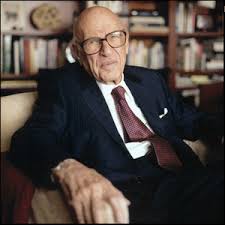Rule No.1: Never lose money. Rule No.2: Never forget rule No.1. - Warren Buffett, Chairman, Berkshire Hathaway
Monday, February 20, 2012
The Best Investor You've Never Heard Of - God Bless
One of the finest value investors in the world passed away yesterday in New York city. Walter Schloss, was surrounded by family and passed at the age of 95. If you have not read about Walter's investing style ( and superb track record ) and about the kind of person he was, then I strongly suggest that you do. My investment strategy has been heavily influenced by Schloss' investment framework over the years. He was truly a good guy of wall street. God Bless Walter.

Monday, February 6, 2012
Slowing Down The Game
To invest successfully you need an edge, some kind of advantage over the market. While this "advantage" will not guarantee results every year, it will, if effective, produce good results over a long period of time.
Value investors are often asked what their edge is. After all, value investors don't have complicated computer trading systems, don't check stock prices every minute and many (including me) don't even use a calculator or an excel spreadsheet. So what's a value investor's edge: patience, patience, patience. Value investors understand that the value of a business fluctuates much less (generally speaking, barring some major fundamental change) then it's own stock price. This idea flies directly in the face of the Efficient Market Theorists (EMT), that postulate that a stock is always perfectly priced. It's probably fair to say the markets are pretty good at pricing stocks most of the time, but not all of the time. But there is big difference between always and most.
A picture is worth a thousand words, see below:
So value investors are willing to step when a company's share price is significantly less than the intrinsic value (IV) of the company. Then, you must be willing to wait, perhaps several years, for the market to recognize the undervalued situation and re-price the shares to reflect the company's true IV. It's the waiting period that most investors can't deal with. After all we live in a short-term world, where high frequency traders (HFT), some argue, are responsible for 70% of the volume on major exchanges. A world where mutual funds are ranked daily, and therefore can't focus long-term for fear of losing assets the next guy who "was better last week". The average holding period for these HFT's is 22 seconds. Yes, 22 seconds. Their job is to provide liquidity and capture a small ( 1/3 of a cent or so ) profit with each trade. Sounds way too stressful for me - how do they take a nap? The other one third of the market holds stocks for an average of only 7 months. The "new" long-term for most investors is one year. Consider the following (approximate numbers, source: FT):
Decade Average Holding Period
1940's 7.0 years
1950's 7.0 years
1960's 7.0 years
1970's 5.0 years
1980's <2.0 years
1990's <1.0 year
2000's 7 months
Owning a stock for just a couple of months presents many problems. Firstly, you will likely never capture the closure of the gap between price and value of a company. Therefore, you won't make any money, and you'll take on a lot of risk if you didn't buy cheap. Also, this approach would require you to make dozens of correct decisions a year as your portfolio turns over many times. Your trading costs could eat up much of the profit you might make from your short-term trading activities.
So investors would benefit greatly by "slowing the game down" and allocating their hard earned capital to undervalued investments that offer little risk and significant upside, but will take some time to work out. Remember, you want to be able to sleep at night (or take nap) or take a vacation without your Blackberry to check your stock quotes. Investing is a marathon not a sprint.
This discussion reminds me of a couple of my favorite Warren Buffett quotes:
" lethargy, bordering on sloth, should be the cornerstone of any investment style"
" I'd be a bum on the street with a tin cup, if the markets were efficient all of the time"
Just in case you are wondering, my average holding period is approximately 4 years, with my largest and longest holding at 9 years. My trading cost for 2011 amounted to 0.17% of the value of all portfolios. I don't get a Christmas card from my broker.
Andre
Friday, February 3, 2012
Approaching Intrinsic Value (IV)
I have recently reduced my position in Ensco PLC (ESV) by another one third @ $55.15. Ensco continues to perform well, but is now close to being fully priced. My conservative estimate of ESV is around $60/share ( the intrinsic value of a company is moving target and can't be calculated with precision ) and I generally like to start selling as the price reaches 90% of IV. I'll continue to hold the last 1/3 of my position for now and monitor the Pride International merger and adjust IV accordingly. Also of interest, day rates for rigs are rising and that may explain the recent run for the drillers. We'll see if that lasts....
My initial purchase of ESV was @ $38.20 in 2010.
Subscribe to:
Posts (Atom)